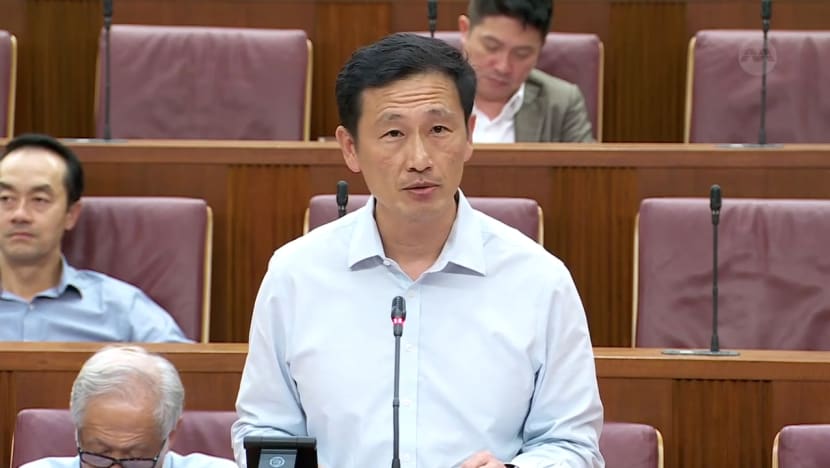Future pandemic response should not be about 'fighting last war': Ong Ye Kung
While Singapore's COVID-19 response was based on what was learnt from the SARS outbreak, "expect the next pandemic to be different", says Health Minister Ong Ye Kung.

Health Minister Ong Ye Kung speaks in parliament on May 10, 2023.

This audio is generated by an AI tool.
SINGAPORE: There is a tendency for governments to prepare for old challenges rather than new ones, and this applies to the approach to pandemic preparedness, Minister for Health Ong Ye Kung said on Tuesday (Jun 18).
Speaking at a virtual conference to launch a new Independent Panel for Pandemic Preparedness and Response Report, Mr Ong shared the lessons Singapore learnt from the COVID-19 pandemic and what the country is doing to prepare for the next pandemic.
The Health Minister noted the conclusions of a White Paper on the government’s review of its pandemic response, which the Prime Minister’s Office published in March last year.
It listed the effective responses and acknowledged areas where the government had "fallen short".
"The lessons are many, so let me focus on one key thrust, which is that governments, just like any other organisations, are prone to make the mistake of fighting the last war. And that was the case for COVID-19," said Mr Ong.
He acknowledged that Singapore's COVID-19 response - similar to that of many East Asian countries - had been based on what was learnt from the 2003 severe acute respiratory syndrome (SARS) outbreak.
The spread of SARS had been curbed through contact tracing and isolation, Mr Ong said.
"In Western countries, on the other hand, their responses, I think, are based on what they learned during a bad influenza season, so they tried to ride through the epidemic with higher than usual patient load at hospitals, but eventually, things would subside and go back to normal," he added.
Both approaches to COVID-19, however, "turned out to be unworkable because they were fundamentally responses to the last war that the respective regions had experienced", Mr Ong said.
Singapore, as did other East Asian countries, soon realised that COVID-19 was "far more transmissible than SARS" and that tracing and isolation could not contain the virus.
Western countries generally took a different approach but found that the virus was far more severe than influenza and by trying to ride through the transmission wave, their hospitals were overwhelmed, leading to more deaths, Mr Ong noted.
Singapore has drawn lessons from the COVID-19 pandemic but "the more enduring insight, or even wisdom, is to expect the next pandemic to be different".
This means the country "must be prepared for the worst-case scenario", he said.
While SARS infected fewer people than COVID-19, SARS had a higher fatality rate of around 9.5 per cent.
In comparison, the fatality rate of COVID-19 - which had infected more than 766 million people worldwide and killed nearly 7 million as of May 24, 2023, according to the World Health Organization (WHO) - is about 0.9 per cent.
The next pandemic could be as severe as SARS, and as transmissible as an influenza virus, said Mr Ong.
MEASURES TO DEAL WITH NEXT PANDEMIC
Mr Ong pointed out that a "full range of measures" would be needed during a pandemic as the common mission as a healthcare jurisdiction is to minimise deaths.
This ranges from "entirely domestic" social restrictions - up to and including a lockdown - to curb the number of infections, as well as vaccines and other medical countermeasures, and ensuring healthcare facilities are adequate and competent.
"Governments need to prepare people to accept such measures, no matter how draconian they are, in an emergency," Mr Ong said.
For social restrictions, Singapore amended the Infectious Diseases Act to allow the authorities to implement appropriate restrictions and responses during a pandemic alert or emergency.
On the other hand, vaccines and medical countermeasures, as well as adequate healthcare facilities are not "merely domestic efforts".
"Developing vaccines and medical countermeasures, for example, is a global effort. Singapore is contributing to the 100-day mission with our niche expertise, but that is all we have - niche expertise," Mr Ong said.
"We do not have all the expertise to develop an effective vaccine for the next time. So we are not seeking to develop a Singapore vaccine for the next pandemic; we are working with scientists around the world to develop the best possible vaccine in as short a time as possible."
Mr Ong noted that building up production capacity for vaccines when there is time and space to do so is the "best way to address vaccine inequity".
"Capacity is not built up through coercion and force, but by encouraging and facilitating investment from the pharmaceutical industry," he added.
"Governments need to be a strong partner to industry, to incentivise them to conduct research and development, formulate, produce and distribute the vaccines."
Singapore has since attracted five vaccine manufacturers to set up their production facilities here, which will eventually produce more than a billion doses per year.
"As for the adequacy of the healthcare system, while it is a domestic response, many countries of the Global South require support and help. They will need capacity building to strengthen disease surveillance systems, better equip primary care and expand acute care," said Mr Ong.
Mr Ong acknowledged that this will require global financing, which is the motivation in setting up the Pandemic Fund, under the supervision of the World Bank.
Singapore has pledged about US$18 million (S$24.3 million) to support the WHO Investment Round for its 14th General Programme of Work 2025-2028, he added.
"We hope to prioritise our contribution for capacity building amongst developing countries, and hopefully catalyse contributions by other nations."

















